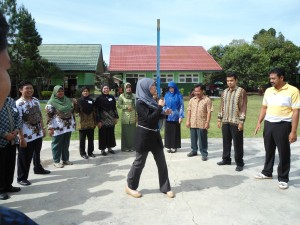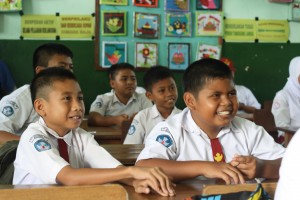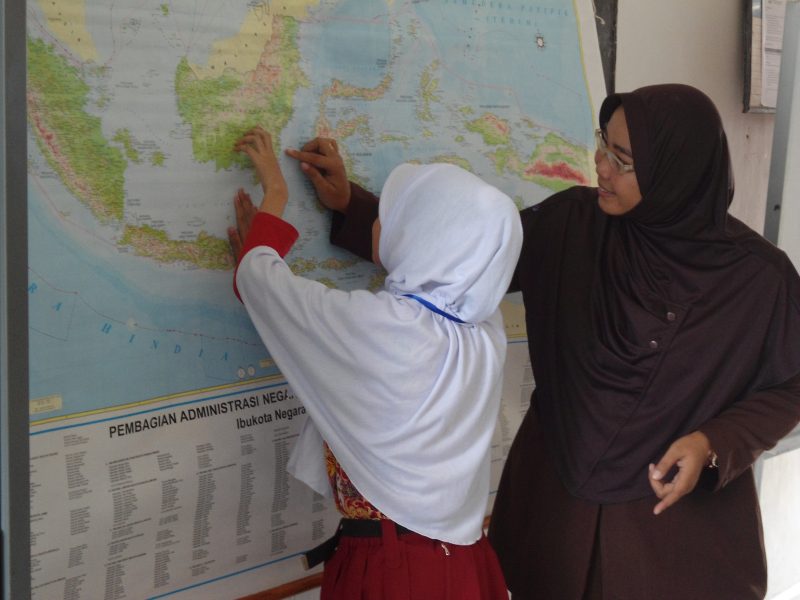Teachers play a crucial role in bringing out their students’ potentials, yet many in Indonesia lack academic skills. Education consultant ProVisi Education works with non-profit organizations (NGOs), corporate social responsibility (CSR) programmes and the local government to tackle this issue and help revive the education system in Indonesia.
In 2002, Juli Adrian, along with four of his friends, decided to build an education consultancy that would help schools improve their programmes. When they first started, ProVisi Education visited schools and offered development programmes designed to help teachers educate students better.
But after four years of running, ProVisi Education realized that the schools they worked with, which were mainly private, were not the ones who actually needed help the most.
Adrian found that there were more schools in Indonesia that did not have access to the kind of training programmes that ProVisi Education provided. So in 2006, the education consultant redesigned their module system and shifted their target clients to NGO, CSR programmes and the local government.
Accordingly, the company’s respective clients take on different interests in line with their purposes. Mining companies, for instance, usually focus on improving the capacity of local stakeholders, whereas consumer or retail industries like banking or airlines would rather focus on mobilization and the scope of area where the project would be conducted. NGOs, on the other hand, consider their missions to be the most important aspect in a project, while the local government normally endeavours to strengthen local capacity.
Although ProVisi Education manages to cater to the needs of various clients, Adrian assures that it is not without a mission of its own, which is ‘to contribute significantly to improving the quality of education in Indonesia’. Apparently, this has been the objective since the beginning.
One of the reasons that motivated ProVisi Education to rethink its plans at the time was the finding of a stark contrast between teachers in international standard schools and local schools in rural areas.
The company discovered that compared to teachers found in rural areas, those in international standard schools had better academic skills and teaching methods.

The quality of teachers is believed to be one of the most common problems that Indonesia faces when it comes to education and it is not only due to pedagogical skills. Adrian believes that culture also contributes to the poor quality of teachers in this country, which is even more enhanced by the government’s inconsistency in applying educational policies.
“We have a lot of regulations that are related to education. We have teacher certifications, national standards, and curriculum. But I think that the government doesn’t provide a master plan to cover the next 20 years because it keeps changing every time.”
The government’s frequent changes seem to mirror the recent introduction of another strategy known as ‘4C’. In early February, the Ministry of Culture and Primary and Secondary Education promoted four principles: creativity, critical thinking, communication and collaboration, which should be considered the core values in schools all around the country.
Aiming to keep up with the progress of education systems, Minister Anies Baswedan asks teachers in Indonesia to adjust their techniques. “Teachers need to change. Teachers must be creative. If the teachers are not creative, it would be difficult for the students to be creative. Similarly, if the teacher’s communication is lacking then it would be difficult for the students to communicate.”
Although the government is doing what they can to refine both the quality of education and teachers, founders of ProVisi Education still feel that it is also their responsibility to take charge. And understanding how the skills taught at schools greatly contributes to students’ futures in professional settings, they notice that a lot of fresh graduates are not prepared to enter the work industry due to their inability to meet the required standards.
“The industry never asks what you have learned. What they require are team-building skills, problem solving, and creativity. And these qualities are not systematically taught in schools,” Adrian explains.
With over 40 clients so far, ProVisi Education has been working to help solve such problems through multiple projects taking place in 19 provinces all over Indonesia. Today, they are working on various kinds of programmes in East Halmahera, Jambi, Batam, and Papua.
These programmes involve education profiling, which is included in their Designing Strategic CSR Programme; School Development Programme, Environmental School, Literacy Development Programme, and Teacher Competency Improvement Programme; as well as monitoring and evaluation, which are included in the post-programme activities.
Indonesia has 212,000 schools, 3 million teachers, and over 500 districts where ProVisi Education hopes to continue their work to make a change. “I wish that sometime in the future we can provide useful materials for teachers so that they can teach better and the students can benefit more,” Adrian says.
When asked what the value of education means for him personally, Adrian immediately thought of his teachers and the people who have guided him in the past. “I think I can be where I am now because I met a lot of great teachers in my life,” Adrian says.
He further adds, “I hope that one way or another we can also be one of the inspirations for students and teachers and schools that we are working with.”
As a student myself, I hope that we can all learn from ProVisi Education and understand the significance of having great teachers in our lives. We would like to take this opportunity to thank all the inspiring teachers for their commitment and dedication to education.
For more information please visit ProVisi Education’s website at www.provisieducation.com




